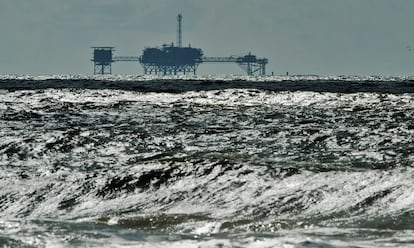Gulf of Mexico oil worse for climate than thought, according to a new study
Reductions in both methane and carbon dioxide emissions are essential to lessen the future severity of climate change, the study notes

Offshore oil and gas operations in the Gulf of Mexico are releasing far more climate-changing methane than official estimates show, according to a new study published Monday.
Using data collected from aircraft in part, climate scientists found the additional methane coming from oil and gas platforms in the Gulf region raises their carbon intensity — the amount of climate-changing gas per unit of energy in the fuel — to twice as much as estimated by U.S. agencies like the Bureau of Ocean Energy Management. The study is published in PNAS, the Proceedings of the National Academy of Sciences.
Reductions in both methane and carbon dioxide emissions are essential to lessen the future severity of climate change, the study notes.
“You don’t have to travel halfway around the world to find unusually high emissions in oil and gas fields,” said Rob Jackson, a Stanford University climate scientist who was not involved in the study. “It’s happening right here in our backyards.”
Other climate scientists who were not involved in the study praised it for its approach.
“This study represents a novel and thoughtful assessment of the climate impact of oil and gas production in the Gulf of Mexico,” said Riley Duren, a research scientist at the University of Arizona who leads Carbon Mapper, a group pioneering accessible and transparent information about where greenhouse gases are being released. “In particular, the authors have demonstrated the importance of jointly quantifying methane emissions from leakage and venting and carbon dioxide emissions from combustion.”
Eric A. Kort, a climate scientist at the University of Michigan and co-author of the study, said the majority of the methane emissions researchers found were wafting from oil and gas operations in shallow waters, where the oldest oil platforms are. The problem was most acute where energy companies are mostly going after oil and aren’t that interested in the methane gas that lies underground with it, so simply release it into the air.
“It was easier to build platforms in shallow water and drill in shallow waters. Now there’s opportunity to extend out into quite deep waters,” Kort said.
But this gas has a powerful effect on the climate and is responsible for a significant amount of the climate change we are already experiencing.
The oil platforms out in deeper water emitted much less methane per unit of energy.
The findings could have implications for future offshore oil and gas operations as the federal government prepares to lease more areas in the Gulf for drilling. The Inflation Reduction Act includes a provision that mandates the federal government offer extensive new offshore leases in federal water for oil and gas drilling if it wants to lease for offshore solar and wind energy.
Kort said that the findings can help policymakers or federal and state agencies compare the climate impact of shallow versus deepwater drilling, to guide where they offer leases.
“It’s very clear from our results that expanding production in shallow waters, the way it’s been done historically, would have disproportionately high climate impacts,” he said.
Alan M. Gorchov Negron, another climate scientist at the University of Michigan and study co-author, said there are ten more lease sales scheduled for waters in the Gulf of Mexico over the next five years.
“This question of the climate impact of future production will return,” he said. “So it’s still relevant to future lease sale climate impact statements.”
Sign up for our weekly newsletter to get more English-language news coverage from EL PAÍS USA Edition
Tu suscripción se está usando en otro dispositivo
¿Quieres añadir otro usuario a tu suscripción?
Si continúas leyendo en este dispositivo, no se podrá leer en el otro.
FlechaTu suscripción se está usando en otro dispositivo y solo puedes acceder a EL PAÍS desde un dispositivo a la vez.
Si quieres compartir tu cuenta, cambia tu suscripción a la modalidad Premium, así podrás añadir otro usuario. Cada uno accederá con su propia cuenta de email, lo que os permitirá personalizar vuestra experiencia en EL PAÍS.
¿Tienes una suscripción de empresa? Accede aquí para contratar más cuentas.
En el caso de no saber quién está usando tu cuenta, te recomendamos cambiar tu contraseña aquí.
Si decides continuar compartiendo tu cuenta, este mensaje se mostrará en tu dispositivo y en el de la otra persona que está usando tu cuenta de forma indefinida, afectando a tu experiencia de lectura. Puedes consultar aquí los términos y condiciones de la suscripción digital.








































